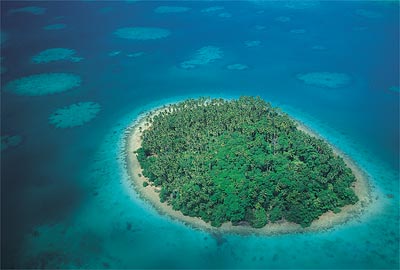
Yap: The land of stone money - An emotional Return
Ten years ago this month Kansas City Star photographer Francine Orr arrived on the tiny Western Pacific island of Yap to begin her service as a Peace Corps volunteer. Francine grew up in the suburbs of Denver and knew next to nothing about Yap. But she knew she wanted to make a difference in the world. She wanted to serve. And Yap was where fate decided she would go to serve.
Yap is one of the four states in the Federated States of Micronesia. It is north of the equator, in the western Pacific, south of Guam and east of the Philippines.
Last month Francine returned to Yap for the first time since she finished her term in the Peace Corps, eight years ago. Some of the children she'd taught English were graduating from high school. Some of the older people she'd been close to were becoming frail. She wanted to reconnect with her Yap friends and "family" while they were all still alive and still remembered her.
The Star asked Francine to document her return to Yap in the way she does best -- in photographs.
The Peace Corps placed me in the village of Betchiyal, in Ma'ap (pronounced mop) municipality, on Yap proper. After six weeks of language training, I could say "thank you," "excuse me," "I like fish" and "there are a lot of mosquitoes."
Waiting for me when I arrived was Tamag. He became my friend, chief, boss, protector and sponsor "father."
I had never seen anyone who looked like him. He was sitting on a bamboo bench, next to his large basket. He was thin and wore a thu, which is something like a loincloth, with hibiscus fibers wrapped around the cloth. No shirt. No shoes. He had curly black hair, a black mustache, a muscular build and brown skin.
He sat smashing betel nut with a piece of metal into a small cup. He scooped the betel nut into his mouth and chewed it. He didn't have very many teeth, and those he had were black from chewing betel nut.
I greeted him with "kamagar", which means "thank you," a typical approach on Yap. I sat on the bamboo bench across from him, wearing a skirt, a blouse and zoris (sandals), with my small basket next to my backpack that contained all the personal belongings I'd brought from Denver.
Tamag is a navigator and canoe builder, deeply rooted in Yapese tradition. He speaks both Yapese and Japanese. One of my jobs as a volunteer in his village was to help him with his project, the Betchiyal Cultural Center. My job was to assist him, to obtain grant money for the project, to advise him.
Yet I didn't speak his language. I didn't understand his culture. I was under 30 and female. In Yap tradition, a young woman would never give a chief advice.
During my time on Yap, I struggled with the language, struggled with my health and struggled with my role. Yet through it all, Tamag was patient and kind.
It was then time to walk to Betchiyal. Tamag stood, holding his basket, and I followed behind him. The path was white sand, with palm trees and stone money on either side. Small children peered out from behind trees to glimpse the new volunteer and then quickly retreated. No one spoke.
We walked through the villages of Wanad and Tarou, up and down a hill, over an old stone path, across a small wooden bridge and then into the village of Betchiyal.
I could see people waiting for me, near the kitchen, a structure made of wood, with tin on the roof and two side walls. The other sides were left open. There were about 20 people, including women and small children running around, and dogs and chickens. I sat and drank a coconut while people looked at me. This was to be my home for more than two years.
In this place I learned to appreciate the richness of a different culture with different traditions. This is the place where I learned different didn't mean inferior. People looked, spoke and ate different from me. Yet beyond all the differences, I discovered a common human bond. Friendship.